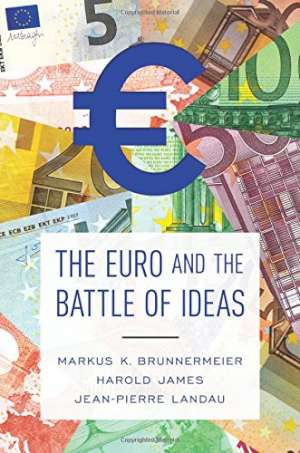02 March 2017
The Euro and the Battle of Ideas
Markus Brunnermeier, Harold James and Jean-Pierre Landau
2016, Princeton University Press, 328 pages,
ISBN 978-0691172927
Reviewer: Rebecca Harding

This book’s laudable objective is to explain the crisis of the Euro, and indeed the Eurozone since the global financial crisis, in terms of the ‘war of ideas’ between Germany and France. It starts with the Deauville meeting between Angela Merkel and Nicholas Sarkozy in 2010 and argues that this was the point at which the clash of visions between the two resulted in ‘dramatic’ but ultimately short-term compromise. The compromise could be only partial. This, the authors argue, highlights the divisions between the two countries which have never fully been explored but which have had major consequences for the way in which the Eurozone’s response to its successive crises has moved from European institutions, towards Berlin and Paris and, ultimately, to Berlin.
Thus the euro-crisis has led to “the outbreak of a war of ideas” and a “seismic shift of power.” Equally, the response to the crisis has also been driven by the same war of ideas. In one corner, Germany, representing the Northern European view, is seen as rules-based and prudent: the focus is on price stability and economic management based on government expenditure within the means of the government itself. France, seen as representing a southern European view, has a contrasting focus on economic management with a bias towards social solidarity. Post-war history, indeed post-unification economics, has made Germany more focused on rules and economic governance in contrast to its pre-War perspective, while France took a more structured approach before the war and has become more liberal since. The authors argue that this demonstrates that economic cultures are not deeply entrenched, and can change in response to severe historical crises.
The book correctly views the euro project as a political one and its failures as emanating from the inadequacies of the Maastricht Treaty, which failed to resolve the different economic and philosophical views of the two central protagonists, Germany and France. In particular, it argues that the fact that the response to global financial instability was never considered within the Maastricht Treaty created a fault-line that extended across the whole of Europe to Greece, Italy, Spain, Portugal, Ireland, Cyprus, and to some extent to France as well. The national dimension of global instability was not adequately considered and as a result, the definition of ‘systemic risk’ in a Eurozone context was never fully explored.
The authors align Anglo-American thinking with French philosophy, arguing that there are many parallels’ in deep-rooted “Keynesian thinking and an emphasis on liquidity over solvency considerations.” To anyone who has watched either US or UK monetary policy over the past 30 years, or indeed Anglo-German relations in the last 10 years, this seems an extraordinary statement and it is it this style of assertion-based argument that undermines the undoubted rigour of research that has gone into the book. History, economics and finance are mixed with a liberal dose of literature, which, the authors hope will lead to an “economic ideas union.” From a French, German and British background, based in an American university, this argument is welcome but poorly executed.
The book leaves the reader frustrated at the looseness of the conclusions. It argues that there is “no clear way of representing the general interest of Europeans” and argues that the ‘non-dialogue’ in Europe is based on mutual misinterpretation of good intentions as “egotistical desires” and “sinister masterplans.” But while they argue correctly that Europe has an issue of democratic legitimacy, the authors frequently refer to the “Machiavellian” nature of Germany’s power (for example it brought in the IMF because it was aligned more closely with Germany’s prudent and rule based view of the world). Such language simply serves to add fuel to the flames.
This is not least the case because the book as only a weak definition of power and Germany’s soft power within a European context. Angela Merkel has had to become the answer to the Kissinger question: who do I call when I want to talk to Europe. It is Europe’s largest economy. It went through a massive structural change with reunification and had no political mandate within Germany to create a “transfer union” within the Eurozone. As the Eurozone crisis unfolded, as the authors themselves acknowledge, it became clear that France was mired in its own economic woes. Some shift of power to Berlin was inevitable leading others to concluded that Germany was a “Reluctant Meister.” Yet this perspective is barely considered.
In the end this is a book that promised an inter-disciplinary and cross cultural look at the Eurozone crisis but that failed to deliver a synthesis of the disciplines in a way that really added value to what has become a tired and irritatingly dichotomous debate. To anyone who studied Rhineland Capitalism and the benefits of shared stakeholder values, Germany and France seem much closer than the approach in this book would suggest.
